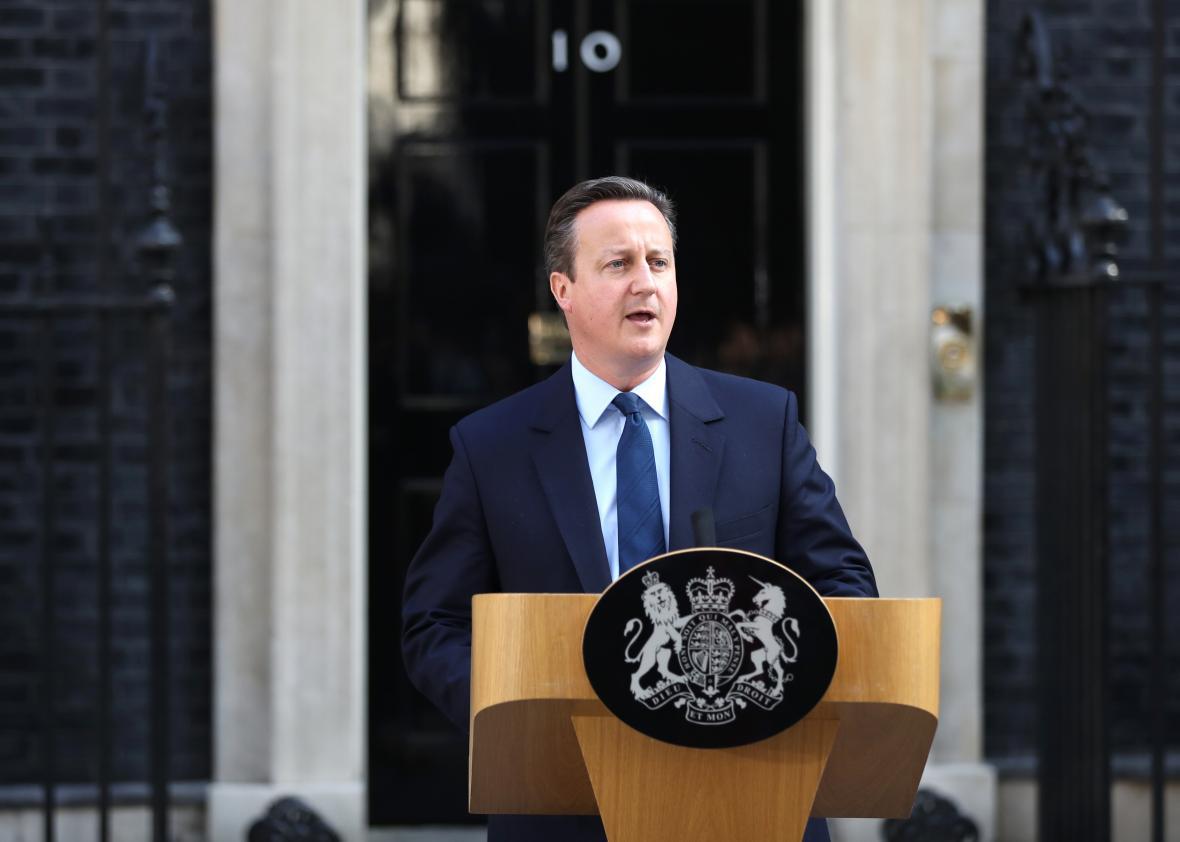David Cameron may be the worst prime minister in modern British history. That dishonor is typically bestowed upon Neville Chamberlain, who ceded Czechoslovakia to the Nazis in 1938 and will forever be bound to the word appeasement. But poor Neville’s defenders can at least argue the man didn’t have many better options, since Britain wasn’t necessarily ready to take on Hitler’s forces in a war, and the time gained by sacrificing the Czechs allowed it to arm up. On the other hand, Cameron’s calamitous decision to allow a referendum on whether the U.K. should remain in the European Union—which unexpectedly ended in a vote to leave Thursday night—was a blunder entirely of his own making.
Cameron, who announced Friday that he will resign, did not want to leave the EU. For a long time, he didn’t even truly want a referendum on the issue. He felt compelled, however, to appease his party’s angry Eurosceptic faction in order to keep a firm hold on power. “At the 2015 general election Europe seldom featured in the top 10 of issues listed by voters among their principal concerns; Mr Cameron’s problem was that for some of his MPs it was the main reason they went into politics,” the Financial Times writes. And so Cameron promised to renegotiate the terms of Britain’s membership in the EU, and then put the question of whether to remain to a popular vote. Some of his fellow Tories, like Chancellor of the Exchequer George Osborne, thought it was an absurd gamble.* But the prime minister assumed that the British people would choose to stay and that he could put to rest the idea of secession once and for all.
Instead, the Brexit campaign became an outlet for the angry nativism of England’s aging working-class voters, impervious to fact or reasoned judgment. Now the world has to live with its consequences. And, as the terror in the markets and plunging value of the British pound should tell you, not many people outside England’s obscure suburbs and villages think the effects will be worth cheering. The U.K. is about to sever itself from a massive trade bloc, calling into question its own economic future, all while creating the specter that energized anti-European parties in other countries will push for their own secessionist referenda. The far right in the Netherlands and France are already celebrating. Nobody knows what the future holds, of course, but Europe’s tomorrow looks a lot bleaker than it did before this completely unnecessary vote.
Theoretically, Britain does not have to go through with this idiocy. The referendum is not legally binding. David Cameron doesn’t have to push his country off a cliff, just because voters thought it might be fun.
But he seems determined to do so anyway. “The will of the British people is an instruction that must be delivered,” he said during his resignation speech Friday. He might as well have quoted H.L. Mencken, who wrote, “Democracy is the theory that the common people know what they want, and deserve to get it good and hard.”
But then again, there’s a reason developed democracies don’t typically make world-historic decisions by referendum. Voters are fickle. They make decisions in the heat of the moment and change their minds quickly. Twitter has been filled on Friday with stories of regretful “Leave” voters waking to realize that they’d made a mistake, that they’d never believed Brexit would actually prevail. The final count in a single election can be influenced by freak accidents or the weather; on Thursday, storms flooded much of southeast England and turned London’s evening commute into an unholy mess as trains were delayed and canceled, which surely cost the “Remain” side some votes. If the result of the Brexit goes poorly, there isn’t necessarily anybody to hold accountable—a country can’t vote itself out of office. That’s all fine if the results of a popular vote are reversible, if you’re deciding on whether to legalize marijuana or cap property taxes. But when they’re not? Perhaps its better to leave the decision-making to the people elected to do so. You wouldn’t put a war up to a popular up or down vote, since you can’t unfire the first shot. The decision to leave Europe forevermore shouldn’t have been any different.
You also have to ask: Whose will is being represented? The “Leave” campaign relied largely on the votes of aging English people—those younger than 50 generally preferred to remain in the EU. Of course, older people are typically more enthusiastic about voting. But should the rash decision-making of Britain’s senior citizens really be the factor that decides whether a child born today will get to be a citizen of Europe, whether someone who graduates college in a couple years can work in 27 other countries, or just one?
According to Cameron, it should. Which is why historians will throttle him.
*Correction, June 24, 2016: This post originally misidentified George Osborne as the counselor of the exchequer. He is the chancellor of the exchequer.
